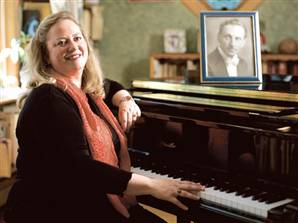 |
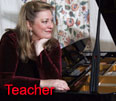 |
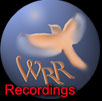 |
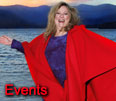 |
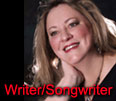 |
| Struggling to Make Peace With the Atom
One of the things Dad and I shared was our uneasiness about his contribution to history. By Danielle Woerner
I was proud of him, though, with his beautiful singing voice and Technicolor mind. When he'd visit my class to give his annual science talk, he'd bring fossils, talk about mammoths, explain the secrets of the atom. He'd hold an electric generator in one hand and allow a current to pass through his body to light the fluorescent tube in the other. For days after, even kids who usually ignored me would rave about my amazing father. Dad at his best was incandescent. But by high school I often saw his shadow side. Not only did many of our values conflict, but any disobedience on my part could make him explode. I was a folk singer then, with a repertoire of protest songs including Malvina Reynolds's "What Have They Done to the Rain?" about nuclear fallout. At school I joined Students for Peace; at home Dad and I skirmished. In 1969, he got a call from the firm he'd worked for in the 1940s. Now building nuclear power plants, it needed someone with his quality-control expertise. His return there fueled new father-daughter debates: practical electricity vs. toxic waste. It was during those discussions that I learned he'd played a role, however small, in the technology that devastated Hiroshima and Nagasaki. Given his work's classified nature, he said only that he'd been a quality-control inspector at plants that had produced some of the components the project utilized, and that he'd met Albert Einstein, whose unassuming manner had impressed him. Shock and shame at Dad's revelations mingled uneasily in me with awe at his proximity to all that power and light. Dad's attitude was divided, too. He proudly carried a card in his wallet that was signed by the then Secretary of War Henry Stimson, naming him one of the participants in the secret mission. But Dad recalled an incident from his youth, when a psychic friend of his mother's had read his palm. She gazed into it, then recoiled, "as if she'd seen all the fiends of hell," he said. "She could never face me again. After Hiroshima," he hesitated, "I believed that was what she had seen." Dad died 21 years ago—at home, but not at peace with his life, said my mother, who was at his side. We buried his favorite poem, and Stimson's card, with his ashes. Last August, I sang at a Hiroshima commemoration in upstate New York. The service overflowed with memories-- of our fathers' war secrets, the ways combat changed them, the rage they unleashed at home. I shook as I told Dad's story for the first time, but it felt right. Among those present was a woman from Hiroshima, who at the age of 12 survived the bombing but lost both parents. She was the first to reach out to me. We hugged. "You know," said my new friend, "Einstein had doubts about whether he should have shared his formula, but we all forgave him." In this atomic age, we desperately need such generosity of heart. The world's relationship to nuclear power is so much more complex than when the original A-Team first harnessed it. Fission provides cleaner electricity and life-saving medical advances-- yet its effects on the environment and its potential use by terrorists are profound concerns. Superpowers and smaller nations that have been "supersized" by nuclear capability flirt with disaster. Our government seeks billions for new nukes, when our existing stockpile could destroy the earth many times over. I'm especially troubled by our military's use of weapons made with depleted uranium—nuclear waste with a half-life of 4.5 billion years—in every war since Desert Storm. Sixty years ago this August, Pandora's box was opened over Hiroshima. That lid will never be closed. As long as humans possess curiosity, we'll seek to expand our scientific knowledge. The problem isn't with too much knowing, but with too little being: the integration of thought, feeling and spiritual awareness that determines what we do with our knowledge. Gandhi said, "You must be the change you wish to see in the world." So I write, vote and demonstrate for peace. I sing, because I believe in the power of music to touch the core of our humanity, and direct a chorus, Voices for Peace, to bring a harmonious influence to political events. Minuscule efforts no bigger than atoms. But we all know the power of the atom. Woerner lives in Shokan, N.Y. ------------------------------------------ © 2005 Newsweek, Inc.
(Note: The article as initially published introduced a last-minute pre-publication error about the half-life of DU, introduced by an editor unfamiliar with the piece. Newsweek issued a correction, and the article as shown here is in its correct form, as originally submitted by the author. DW) |
